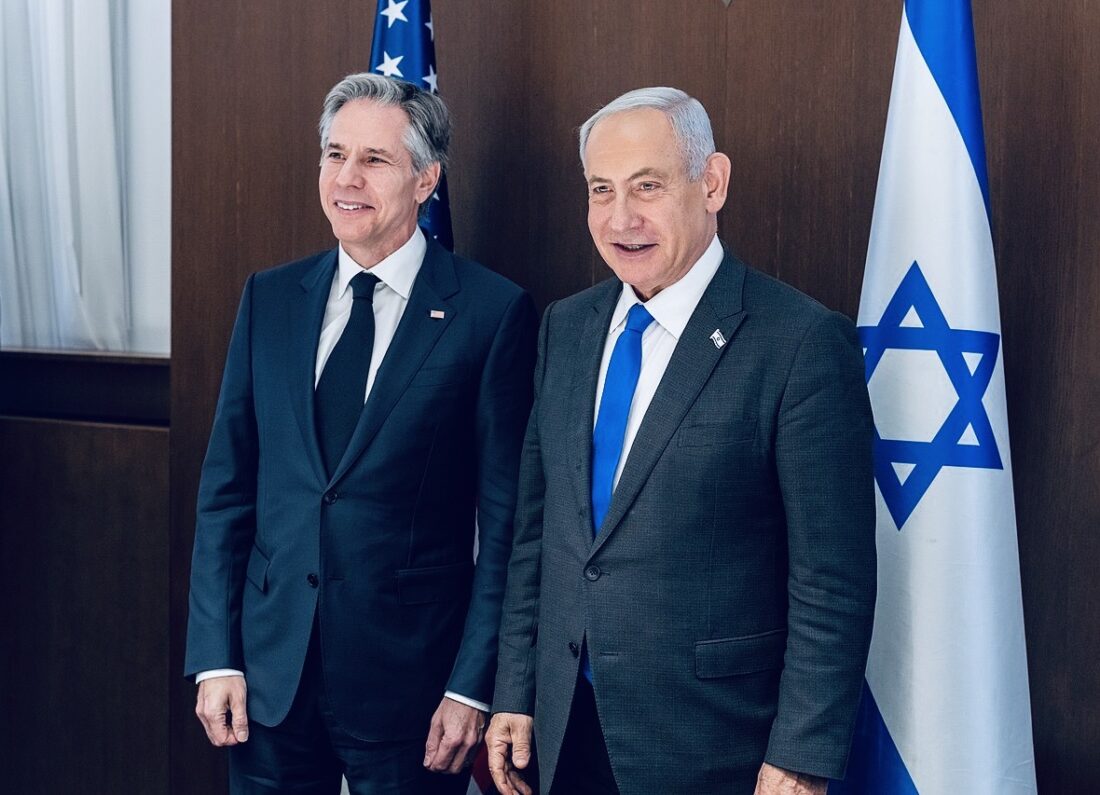Their stiff body language was unmistakably indicative of their sharp policy differences over the combustible, still unresolved Palestinian issue.
As U.S. Secretary of State Antony Blinken extolled the virtues of a two-state solution during his first trip to Israel following the formation last month of Benjamin Netanyahu’s far right-wing government, the Israeli prime minister archly glared at him.
When it was his turn to speak, Netanyahu deliberately failed to mention the Palestinian issue and focused instead on his desire to expand the 2020 Abraham Accords, which led to the normalization of Israel’s bilateral relations with the United Arab Emirates, Bahrain, Morocco and, to a certain degree, Sudan.
As Netanyahu turned to shake hands with him after their press conference, Blinken grimaced, bit his lip and turned his head sideways, as if to signal he would rather be somewhere else.
Clearly, there was no meeting of minds between the two men with respect to the Palestinian problem, which exploded into a cycle of violence yet again last week.
During the course of a few turbulent days, Israeli troops killed ten Palestinians during a counter-terrorism raid on a refugee camp in Jenin, a Palestinian man in fatally shot seven Israelis leaving a synagogue in the Neve Yaakov settlement, a 13-year-old Palestinian boy injured two Israelis in Jerusalem, and Jewish settlers in the Israeli-occupied West Bank launched a series of vigilante attacks on Palestinian civilians.
Angered over the death toll in Jenin, the president of the Palestinian Authority, Mahmoud Abbas, lashed out at Israel and severed security cooperation with the Israeli army, police and intelligence agencies, the third time the PA has resorted to this drastic step since 2017.
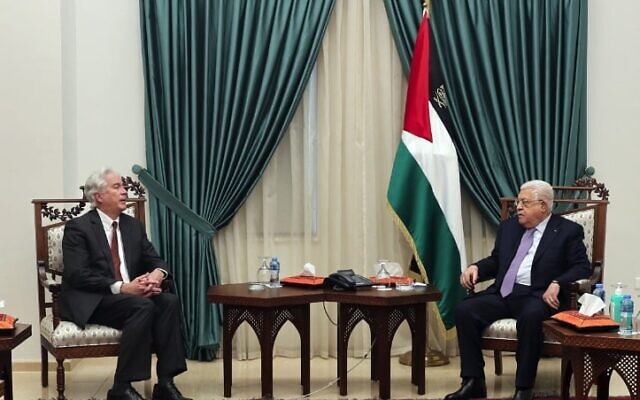
However, in a subsequent meeting with the director of the U.S. Central Intelligence Agency, William Burns, Abbas pulled back, saying that partial security coordination agreement with Israel was still in place. This apparatus enables Israel to combat Palestinian terrorism and the PA to contain Hamas influence in the West Bank.
Be that as it may, Israel’s relations with the PA, mercurial at best, remain cold and distant in the wake of Israel’s recent decision to cancel some Palestinian VIP benefits and to withhold taxes it collects on behalf of the Palestinians. Netanyahu imposed these punitive sanctions shortly after Abbas persuaded the International Court of Justice to draft a legal opinion on Israel’s occupation of the West Bank.
Netanyahu, who returned to power in late December after 18 months as leader of the opposition in the Knesset, has adopted a much tougher line toward the PA than his last two predecessors, Naftali Bennett and Yair Lapid, who offered the Palestinians a wide range of economic concessions in exchange for keeping a lid on terrorism in the West Bank.
Blinken arrived in Jerusalem on a three-day visit shortly after President Joe Biden’s national security advisor, Jake Sullivan, spent several days in Israel taking the measure of Netanyahu’s government, the most extreme in Israeli history.
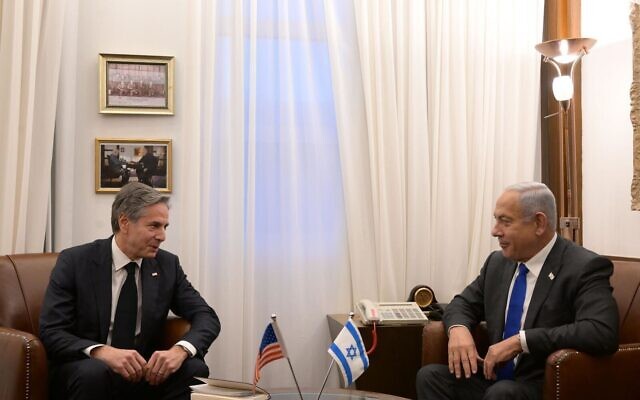
To Netanyahu’s satisfaction, Blinken spoke of the importance of expanding the Abraham Accords and thereby helping Israel further integrate itself into the region. But in a crucial caveat, he declared that “these efforts are not a substitute for progress between Israelis and Palestinians.” In addition, he warned Israel that disengaging from “the vision of two states” would be “detrimental to Israel’s long-term security and its long-term identity as a Jewish and democratic state.”
Elaborating on this key point, Blinken said, “We continue to believe that the best way to achieve it is through preserving and then realizing the vision of two states.” He then called on both sides to “take urgent steps to restore calm, to deescalate.”
Netanyahu, for his part, dwelled on the Abraham Accords, saying that enlarging the circle of peace “would also help us achieve a workable solution with our Palestinian neighbors.” He made no mention of a two-state solution, a formula to which he temporarily paid lip service, but which he abandoned after the failure of Israel’s peace talks with the PA in 2013 and 2014.
Since then, Netanyahu has not met Abbas, but on January 25, Abbas said he would be prepared to meet Netanyahu. “He is not a man who believes in peace,” he said, “but I have no other choice but to deal with him.”
In Ramallah, the seat of the PA, Blinken heard a litany of complaints from Abbas. He charged that Israel is consolidating its hold over the West Bank by expanding its network of settlements and stepping up land expropriations and home demolitions and evictions. As well, Abbas complained about Jewish settler violence and the increased frequency of Israeli army raids into Palestinian towns in Area A of the West Bank.
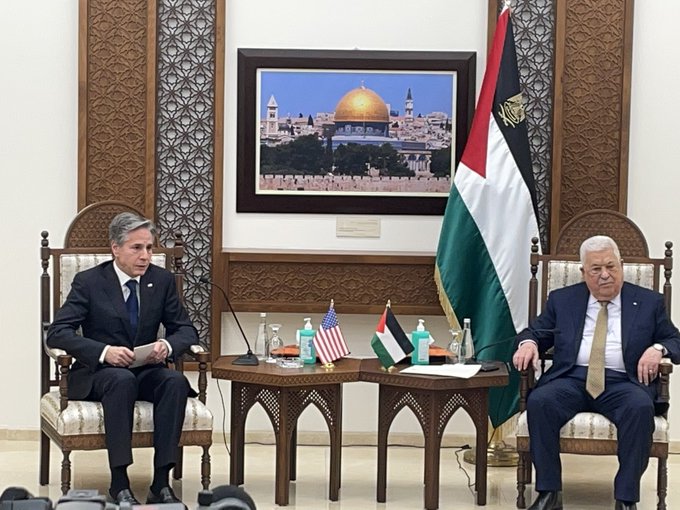
Blinken, in response, assured Abbas that the Biden administration would continue to oppose Israeli unilateral actions in the West Bank and East Jerusalem.
While the United States and Israel share the belief that Iran should not be allowed to acquire a weaponized nuclear arsenal, Israel has adopted a much harder approach to Iran, which rejects Israel’s existence. For the past few years, Israel has been preparing itself for a possible strike on Iran’s nuclear sites.
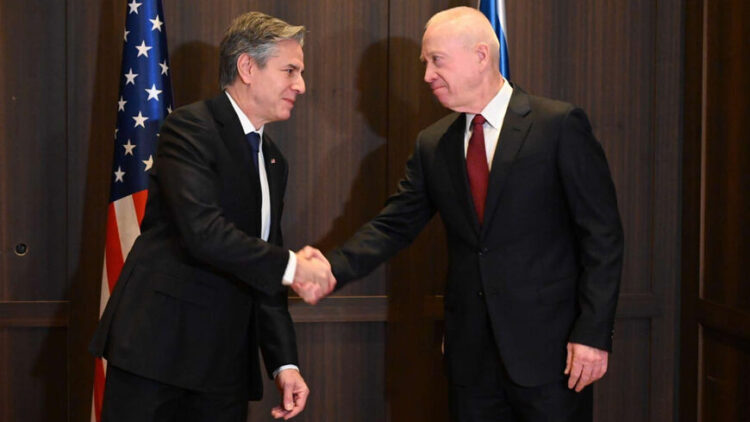
After meeting Blinken, Israeli Defence Minister Yoav Gallant said that the United States and Israel “stand together against the threat from Iran.” Blinken said he agreed with Gallant’s comment and noted that Washington’s “commitment to Israel’s security remains, and will remain, ironclad.”

Prior to Blinken’s visit, the two countries participated in their largest joint air, land and sea military exercise, Juniper Oak, which was regarded as a message to Iran to curb its nuclear activities and withdraw its support for proxies such as Hezbollah and Hamas.
As Blinken was en route to Jerusalem, Israeli drones struck an arms factory in the Iranian city of Isfahan where the medium-range Shehab missile is manufactured. In recent weeks, these missiles, having been sold to Russia, have struck cities in Ukraine.

Iran’s ally, Russia, “strongly condemned” the strike on January 31, saying it had “the potential to provoke an uncontrolled escalation of tensions in a region that’s far from being peaceful.” The statement, published by the TASS news agency, added that “such destructive actions could have unpredictable consequences for peace and stability in the Middle East. That has to be understood by the organizers of the brazen raid, their backers and those who are gloating over the issue, holding on to the futile hope for the weakening of Iran.”
Blinken also discussed Israel’s policy toward the current war in Ukraine, which broke out last February after Russian President Vladimir Putin ordered the invasion of its Slavic neighbor.
Israel has provided Ukraine with humanitarian assistance, but out of fear of antagonizing Russia and thus undermining its ongoing air campaign in Syria, where Iran has been entrenching itself militarily, Israel has refused to send military aid to Ukraine.
While Blinken expressed appreciation of Israel’s humanitarian assistance, he spoke of “the importance of providing support for all of Ukraine’s needs” and said he looked forward “to discussing what more can we do.” Israeli Foreign Minister Eli Cohen, who met Blinken, is expected to visit Ukraine soon.
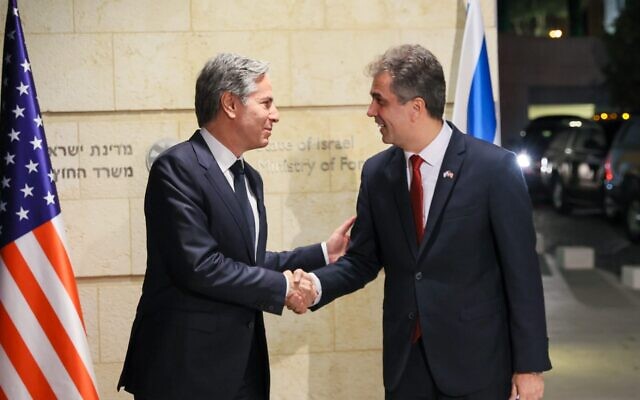
During his discussions with Netanyahu, Blinken stated his opposition to Israel’s intention to pass judicial legislation to weaken the Supreme Court and strengthen the executive branch of government. The United States fears that it will undermine Israeli democracy and interfere with the principle of governance by consensus.
“Throughout the relationship between our countries, what we come back to time and again is that it is rooted both in shared interests and in shared values,” said Blinken. “That includes our support for core democratic principles and institutions, including respect for human rights, the equal administration of justice for all, the equal rights of minority groups, the rule of law, free press, and a robust civil society.”
In a reference to the weekly demonstrations that have taken place to protest Netanyahu’s proposed legislation, Blinken noted that “the vibrancy of Israel’s civil society has been on full display of late.”
“We share common interests and common values,” Netanyahu retorted. “We will remain, I assure you, two strong democracies.”
Differences over key issues, though, are pulling Israel and the United States apart.
Blinken left Israel on January 31, leaving behind Assistant Secretary of State for Near East affairs Barbara Leaf and Special Representative for Palestinian Affairs Hady Amr, who will attempt to contain the renewed fighting between Israel and the Palestinians.
No one on either side really believes this is possible.
